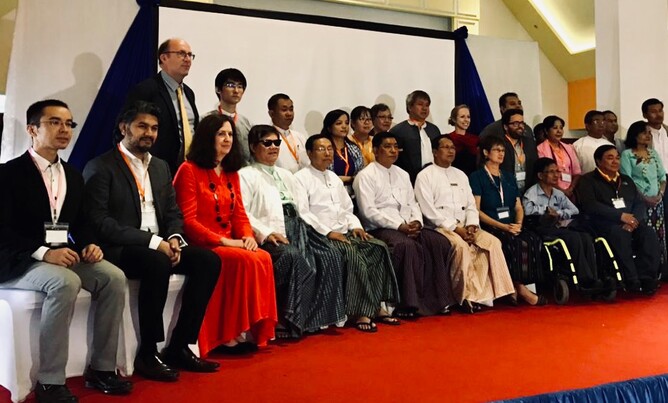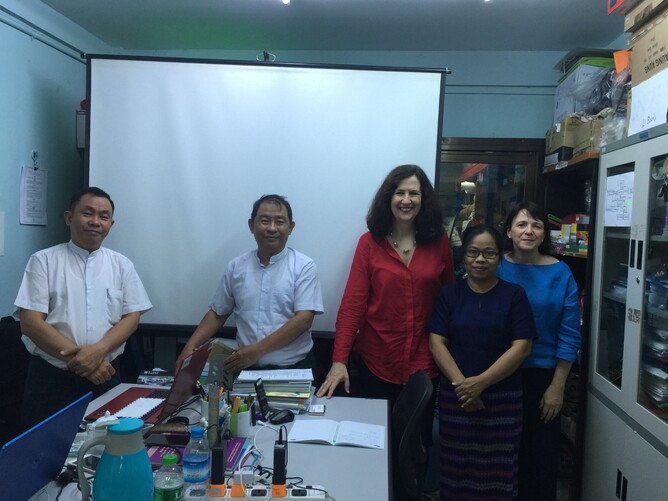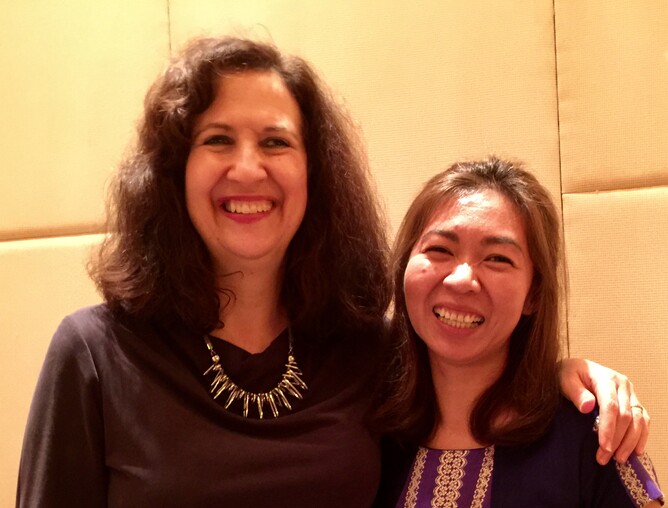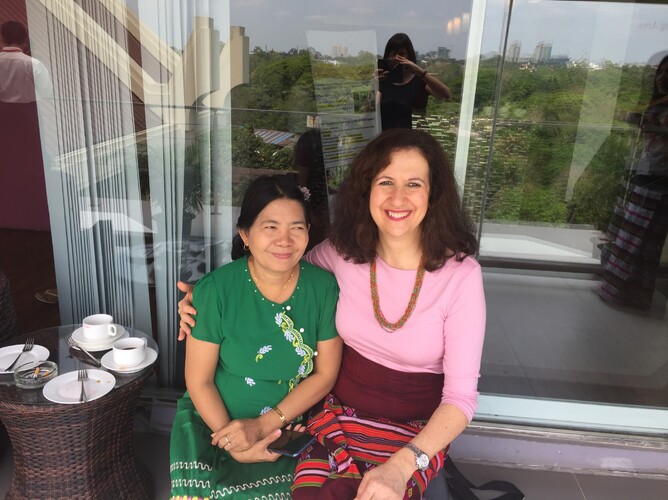Summary
This article describes the process and timeline of applying for an Access to Work grant to support a key business trip to Myanmar (Burma) for me as the deaf Director of a thriving and growing social enterprise, Result CIC.
The key points:
- I applied 6 weeks before travelling to allow good time for planning.
- AtW did not inform me of: any timeframe enabling me to plan the trip, rules about payment of support workers nor how any grant would be treated alongside my UK one. Communication internally and with me was confusing unnecessarily stressful and diverted personal resources away from business priorities.
- There was a 4-week silence in AtW’s communication.
- AtW offered 50% of the grant one day before I flew to South Asia.
- AtW reduced the halved grant by further 60% (taking off 80% of the original requested amount) on the final day of the trip without explaining this.
The impact of this was on me was demoralising and undermining; I have deep concerns about the impact it could have on others. I pose questions which Access to Work needs to answer. I also invite your comments.
With fellow speakers at the Myanmar Multi-Stakeholder Workshop on Promoting Employment for People with Disabilities, March 6-7 2019 including senior representatives of Myanmar's government (centre).
How far can we D/deaf professionals go?
This is a question I regularly ask. Usually I am thinking about career progression for deaf clients. But this year I had to ask the question literally for myself – how many miles across the globe could I go as a deaf professional? How far could I go to fulfil a fantastic opportunity?
I am an optimist. If I weren’t I probably wouldn’t be writing this. Handling life’s normal complexities is, as you know, hard enough; coping with the isolation of deafness and needing to also arrange communication support can be tough especially timewise. But what if, on top of all this, the process of making the support arrangements is not clear and undermines us? That way lie serious mental (and physical) health issues.
Late in 2018 I was invited by an ex-mentor to come to Myanmar in South Asia to speak at an international forum on disability and employment. Vicky Bowman is Director of the Myanmar Centre for Responsible Business. The small, dedicated team works on advocating human rights in the workplace, covering a wide range of issues. I am a professional coach and trainer. Vicky said that job coaching would be a topic at the conference. She also said it would be possible to engage with different groups locally which could create potential business opportunities for the future. It looked like a perfect fit and a brilliant opportunity.
I had two distinct reactions: excitement, and sheer terror.
The excitement was about the prospect of exploring a fascinating new place which is in a stage of rapid development. It was about being able to support this development, even if in a small way, as a deaf professional and sow new seeds for future projects. This is what, as a connector, I do best and what has helped me react positively to the removal of a career in the past, and start afresh, making a success of this.
The terror was about the prospect of asking for support.
Asking for help is not easy is it? How many of us feel we have to ‘do it all’ and that if we ask for help this is somehow a weakness?
As a deaf lipreader, I need lipspeakers to make communication clear. I knew that for personal safety and effective communication I would have to have a lipspeaker with me on the trip. In fact the airline which covered the route required this. Two overnight 14-hour plane journeys in 8 days plus meetings on every day of the 5-day working week in a brand new country, would be demanding – but with support – successful and rewarding.
But there was another reason for my terror.
I feared the process. Or rather lack of it.
We have an excellent system in the UK to support D/deaf and disabled people who do paid work. It is called Access to Work. It provides discretionary grants to enable us to be able to fully use our skills in our job. Without it, I could not have started my own successful company, nor been able to develop Result CIC, a thriving social enterprise. I value the support I have received so highly. I advocate for this cost-effective system regularly and have done so while working in Poland and did so in Myanmar.
I did make the trip. And I did have an excellent lipspeaker with me. Without her it couldn’t have happened. I met more than 200 people via my talks and meetings. I learned an enormous amount and yes, sowed good seeds for future business. There was national press coverage of the forum including parts of my speech. The feedback was overwhelmingly positive.
But to make the trip I had to take control of deep fears. My previous experience of dealing with Access to Work (AtW) had, I am not ashamed to say, reduced me to despair. It had involved no timeframe, unpredictable and often very slow communication and an approach to me, as a client, which felt negative and suspicious – and induced feelings of guilt, which I had to fight to expunge.
The time, energy and emotion involved in dealing with AtW left me drained. So frankly it would have been easier to say no to this wonderful opportunity.
I grappled with the feelings of fear. Colleagues and friends encouraged me that it would be worth it. They were right, it was. But sadly, the fears were founded.
Meeting with leaders of the Myanmar Deaf Community Development Association.
Timeline of events
I set out here the timeline of events. It was very difficult to go through this, but I present this in a positive spirit. I want AtW to improve how it operates. I want it to become a more effective tool of implementing the Government’s stated aim of halving the disability employment gap. I actually contributed to a Work and Pensions Parliamentary Committee enquiry into this. And I want people who happen to be, or become, D/deaf or disabled not to lose precious morale and hope that they too can contribute to society via their work.
Dates of the trip: 2–10 March 2019
15 January 2019
We are no longer, regrettably, assigned an advisor at AtW who knows us. So I emailed the last person I had been in touch with. I included documents about my trip including estimated support needed.
18 January: 6 weeks before the trip
Chased the advisor. They put me in touch with a new one.
New advisor emailed same day and asked for a copy of my visa and ‘evidence of how much you will be paid’ on the trip ‘by 25 January’ – giving me one week to supply this.
24 January
I sent two letters to the advisor – one from the inviting organisation and one from my co-Director. And I sent the documentation prepared by the Myanmar organisation for my visa.
I was surprised to be asked about actual earnings. Fees are something any business person would describe as ‘commercial in confidence’ and personal earnings are just that, personal, and in confidence. However, in a spirit of co-operation, I did provide information on my speaker fee and an indication of the range of the professional rates charged.
Arranging for the letter to be produced and the visa information took a couple of hours
29 January
I obtained my e-visa and sent the advisor scanned copies.
From Access to Work: 4 weeks of silence: 24 Jan to 21 Feb
21 Feb: 9 days before flying
The advisor sent an email setting out the estimated budget I had requested in January and asking ‘my support worker to phone her’ (remember that I am deaf). They said they had to ‘clarify some of the funding requested’. Having waited so long for a decision, and having had to go ahead with flight and hotel bookings, I was encouraged by the email which seemed to suggest the support could go ahead. (Remember, I am an optimist!)
But I was also puzzled that AtW wished to speak to my support worker (booking agent) as this clearly contravenes principles of dealing with the disabled/deaf client themselves. It sidelined me and worried me that the request for a phone call was simply for expedience, not for any more positive reasons. Because I was busy in my job prior to the trip and had a lot to prepare for the trip, on this occasion I reluctantly agreed.
I wish I hadn’t (lesson to learn). The advisor quizzed my agent about details of the trip and schedule which I was responsible for agreeing with the organisation in Myanmar. So them having a conversation ‘about’ me was not productive. Those of you familiar with the disability rights movement's phrase 'Nothing about us without us' will spot this - and the play on this in my blog's title.
I did my best to secure a meeting schedule, via several emails with the team in Myanmar, and sent these to the advisor.
26 Feb: 4 days before the trip
The advisor asked me to ‘provide proof of your meetings’ on two of the days of the trip and ‘that you are being paid to attend them’.
I had already provided a letter from my co-Director explaining that I would be paid for the business development work I would be undertaking in Myanmar. So I re-sent this document.
The words ‘evidence’ (used in January) and ‘proof’ were interesting to me. They induced a sense of guilt that I had asked for the support. They seemed to take the position that anyone making an application was a potential fraudster.
1 March: 1 day before flying to Myanmar
I received an email saying that AtW would only provide half of the support needed. It cited that it could only support the Forum attendance and travel days as the other meetings (including with project funders, a local business leader and several disabled people’s organisations) were for ‘development’. It did not explain what ‘development’ meant, nor why this would not be supported.
I fought feelings of worthlessness, frustration and despair. I asked for a senior contact at AtW to whom I could send feedback. I was initially given the standard ‘complaints’ email. I said I wanted to feedback constructively, not complain. The advisor eventually sent me this.
I chose to try my best to put aside the demoralising feelings concerning AtW and focus on doing my best job in Myanmar.
Jane with Nang Ei Ei Mon, leader of a female talent platform in Myanmar. Both delivered speeches at an event on International Women's day in Yangon.
The trip
This will be the subject of another blog. But it was a huge success. This was in no small part thanks to the MCRB team’s hard work and flexibility. They had covered my costs, offered to pay for the keynote speech I delivered and provided a member of their staff as a language interpreter. I felt so appreciative.
Day before returning to the UK
The advisor sent me the formal support offer by email.
Instead of the amount mentioned one day prior to the trip, it gave an amount almost 60% lower. It was a standard letter. The advisor’s accompanying email offered no explanation at all of the drastic reduction in support.
I am a strong, resilient person who has learned through extremely demanding experience to handle my thoughts and feelings. I am also a human being. I was tired by this point and, having spent part of my keynote speech advocating for the UK’s equality systems and Access to Work, felt almost like a hypocrite, demoralised, undermined and yes, upset.
My supportive colleague responded to a tearful text from me saying ‘It must be a mistake’. I realised I could have filtered the email negatively, as my previous experience with AtW had been so hard. So I emailed the advisor asking why the amount was different and had she made a mistake?
12 March: 2 days after returning from the trip
Chased the advisor for confirmation of her error.
14 March: 4 days after my return.
I received an email saying there had been no error. Their ‘authorisation and checking department’ had pointed out that the amount originally offered was not possible as this was ‘already covered’ by my UK budget.
I sent an immediate response saying how concerned the advisor’s email made me feel and asking them to clarify the timeline of events which meant I only received confirmation of the formal budget after the trip had taken place. I received an apology from the advisor, saying the ‘complexity’ of the case had been the reason for the delay. Note the 4 week gap in the timeline above. If the issues were complex, perhaps I could have helped the advisor, and AtW, understand them. But they did not ask.
Meeting a Disabled People's Organisation leader in Yangon
Questions which need asking
To remain sane during this process I had to put in place a ‘Plan B’. A Plan B is possible if you are experienced, confident and resilient. But it still took a lot of courage to go ahead with the plans, without any solid information from Access to Work in time to incorporate this into the plans.
This sorry story produces for me some important questions which I respectfully put forward:
AtW emphasise the responsibility clients need to take when they are given a budget. Absolutely right. So how are AtW clients to be expected to take this responsibility when no timescales are given for budget decision and, in my case, the budget from AtW was only provided after the event (trip) and considerable investment takes place? Doesn’t accountability need to be on both sides?
My experience suggests the advisor was dependent on a final check from a colleague, but didn’t know ‘the rules’ that colleague was applying.
- What is the process used internally to ensure that advisors understand the criteria for making a decision? Shouldn’t these rules be made clear at the very start of the application process and shared with clients to ensure an open, effective dialogue? Wouldn’t this save a great deal of time (and money)?
- What is the impact of the current system on clients’ ability to do their job well?
- How does Access to Work capture ‘return on investment’ data and positive examples of their funding?
I have invited the senior AtW contact to provide the policies used and will include a link to these if they are provided. The polite and positive response I received did not offer these.
Best use of time?
Finally there is the key issue of time. Disabled and deaf people do not have more time than others. But the confusion and unpredictable demands of AtW’s processes, on which we often depend, mean our time is often diverted from productive purposes to frustrating and often unproductive ones. My colleague, Result CIC Co-Director, Hormoz Ahmadzadeh, also made this important point well:
‘We have had to spend considerable time on the issue of Access to Work. It could have been so much better used, focusing instead on developing our company.’
The Director of MCRB, Vicky Bowman, said to me in a follow-up letter to the trip,
‘You instantly became a positive role model through your speeches and meetings with local stakeholders and will be remembered by them.’
Ms. Bowman also commented that more broadly, following her recent meeting with a British FCO Minister:
‘I see strong synergies with the UK's lnclusion Agenda, responsible business practice, and the opportunity to promote UK expertise.’
It is these synergies which I aimed to both support and tap into as the leader of a training and coaching enterprise.
I have worked for 30 years in a series of professional roles in 3 countries. For 9 years I have run my own business. I support others to achieve their goals, feel confident and take positive decisions. If I can feel so undermined by Access to Work’s processes and communication, how will a younger deaf or disabled person feel? How will it be for someone who struggles with written English due to their disability? It is this deep concern which motivated me to write this article.
In response to an email from me, a senior Access to Work representative has offered to put my case to their complaints team and invited me to contribute to a review exercise designed to make improvements to their service. I believe it is possible to improve this service, which holds so much positive potential so hope to be able to be involved. I welcome your thoughts and ideas on this article and your own experiences.



